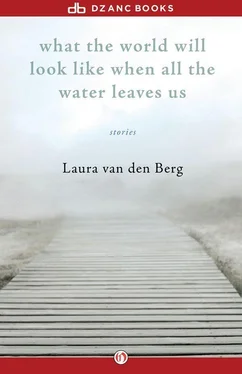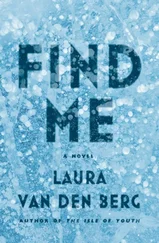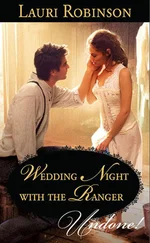She waved Leon inside. “That is a look of desperation.”
“What can I say?” He shrugged and rubbed the stubble on his chin. Like Juliana, he was in his forties. His eyebrows were full and streaked with gray, although his hair was still a rich black. He pulled up a chair and sat across from her. “The tourists aren’t even giving me a second look. I need to have a new vision.”
Leon split his time between waiting tables at a neighborhood café and standing outside the Pompidou Center in a skeleton costume. There were always a handful of street performers in the square; on the afternoons she had gone to see her neighbor, she counted a man who had painted his entire body gold, two violinists, and a teenager doing back flips. The head of Leon’s costume was the most startling: five times the size of a human head with huge black sockets for eyes and jagged teeth. He alternated between jiggling his limbs whenever people walked by and breaking into a kind of grotesque dance, an open guitar case close to his feet. She took a photograph during her last visit: Leon leering at a pack of American teenagers, the shot mistimed so the skeleton head and the buildings in the background were blurred. She kept it on her dresser, propped against the side of the television. She thought of them as people between the acts, although he seemed to be handling limbo with more assurance.
The kettle whistled. She got up and made two instant coffees, knowing what he wanted — lots of cream, no sugar — without having to ask.
Leon sniffed his coffee. “This smells dreadful.”
“I’m out of the regular,” she said. “Don’t drink it if you don’t like it.”
He shook his head and took a sip. She opened her purse and pulled out a sheet of white paper, a drawing she had found underneath Fredrick’s desk this afternoon and chosen not to share with his mother. “Look at this.” She handed it to Leon. “It’s the worst yet.”
Leon was quiet for a moment, holding the paper close to his face. The picture showed a man lying in what appeared to be a river, his stomach cut open and flushed with blood, the hands and feet missing. The man had the same red hair, like all the others. “A madman.” He shook the paper. “I cannot believe he is only eleven.”
“Today I found out the man in the pictures is his father.”
“That’s no surprise,” he said. “Most boys hate their fathers.”
When he gave it back to her, she folded it up and slipped it into a drawer, which contained several other drawings she had brought home, thinking it might be smart to collect evidence, in case something ever happened.
“Careful.” Leon pointed at the drawer. “That stuff will get in your dreams.”
“My dreams are already full of things I don’t like,” she said.
“Juliana.” He finished his coffee and set his cup on the floor. “Would you consider going on a trip with me?”
This was not the first time he’d offered to show her the other regions of France, but she had always declined. The very prospect of travel made her tired and she was unsure of how to interpret the invitations, if he was making overtures.
“I work, remember?”
“We would leave tomorrow and be back by Sunday, traveling south.” He stood and walked over to the photograph on her dresser. “It’s supposed to be even hotter in the city this weekend.”
She was already feeling worn down by the summer temperatures and imagined breezes gusting off the coastline. “What would be the purpose of our visit?”
“To go to the beaches. To get away from your students and those drawings and the heat. We’d take the train to Marseille and then drive to the coast.”
“I’ll think about it,” she replied. “If I can have the window seat.”
“Do you know how I got the idea for this?” He pointed at the photo. “When I was in Spain for the Day of the Dead celebration, I saw skeletons dancing everywhere.”
“Sounds awful.”
“At the time, it was a happy sight,” he said. “But we’ve gotten off subject. Will you come?”
They agreed to meet at Café Concorde in the morning for coffee, then catch the nine o’clock TGV train at Gare de Lyon.
“I wouldn’t drink another cup of yours if you paid me.” He picked up his mug and put it in the sink.
She rose and kissed him on both cheeks. “So stop coming over for coffee.”
After he left, she added her own mug to the sink and filled them with warm water. Then she opened her door and looked outside. The hallway was completely dark, the light by the stairs burned out. Things were always breaking down in the Hotel de Roch; her toilet overflowed three days after she moved in and the hot water once stopped working for an entire week. She went back inside and opened her window in time to hear a melodic siren passing on the street below.
The morning train from Gare de Lyon was curiously empty for a weekend. Juliana leaned into the aisle to get a look at the other passengers, but could only see fingers and elbows and tufts of hair. She watched the blurred landscape, a swirl of yellows and greens with occasional bursts of red and violet. It felt strange sitting so close to Leon, their legs crowded together in the narrow space between the seats. She shifted and squirmed to prevent her knees from pressing against him, but after an uncomfortable period of keeping her legs pulled back, she relaxed and let them bump against his, a small gesture of intimacy that both comforted and unnerved her.
She told Leon about the dream she had last night. She was in the city, standing on a bridge that reached across the Seine, although she wasn’t sure which one. The city was empty — somehow she knew this. The trees had lost their leaves and she could only hear the hollow sound of the river passing underneath. The gray buildings pressed against the sky like graves on a hilltop.
“Then my sister called and woke me. I couldn’t go back to sleep or remember anything else.” They flew by a cluster of stone houses, a dirt parking lot with a pair of dogs stretched out on their sides. “She always forgets the time difference.”
When Leon asked why her sister had called, Juliana told him that Louise wanted to know if she’d given any more thought to her offer of the spare bedroom in her San Francisco loft. It seemed every friend or relative Juliana spoke with encouraged her to return to the States and resume her old teaching job or move to another city and start over, unable to understand why, after everything that had happened, she could stand to stay in Paris any longer.
“Have you given it any thought?” he asked.
“Not very much.” It wasn’t that she wanted so badly to remain in Paris; more than anything, she was incapable of deciding, of striking in a different, unknown direction, and was frustrated by her inability to release herself from her life as easily as her husband had, a top spiraling across a flat surface.
“I visited her in San Francisco two years ago,” she continued. “But I can’t even remember what the city looks like now.” When she thought of California, the only thing that came into her mind was the dense fog that hung over the bay, as though the clouds had sunk down to meet the earth.
The train entered a tunnel and the rush of darkness reminded her of the incident on the metro, which she relayed to Leon.
“I haven’t seen a thing about it on the news,” she said. “It was like we just fell out of the world for a moment, then jumped back in.” She remembered the lights coming back on and seeing a shattered egg near her feet, the yellow yolk oozing onto the floor. “Toward the end, Cole became convinced the Metro was going to be bombed. By the time he left, he’d spent hundreds of Euros in taxi fares.”
Читать дальше












